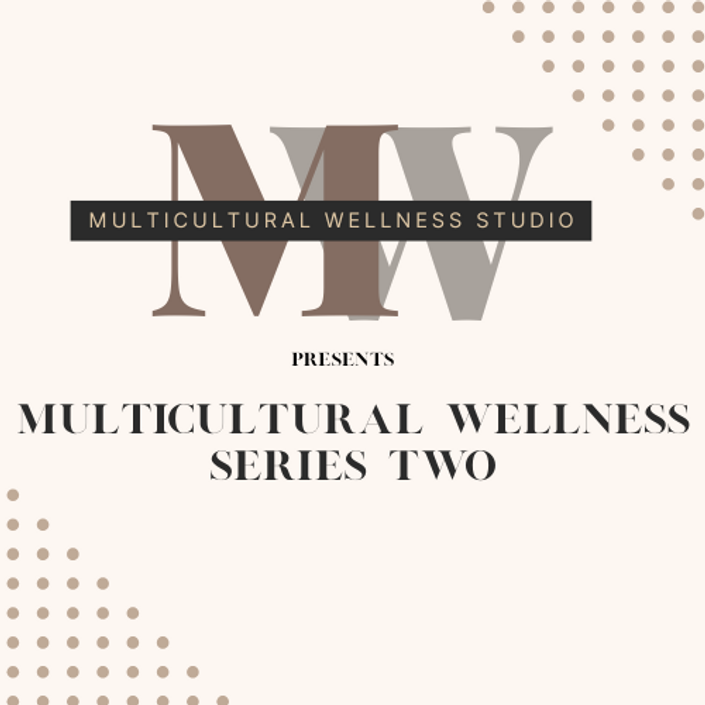
Multicultural Wellness Series 2
The Multicultural Wellness Series provides a safe place to explore ways to improve pregnancy and birth outcomes for marginalized populations. The Series also explores the intersectionality of prenatal and perinatal somatics.
Starts May 7, 2025
Wednesdays, Noon-1:30 pm (EST)
Webinars will be recorded in case someone can't make a date
Sale Price: $49 - (Regular price is $70)
The Multicultural Wellness Studio Series 2 presents two webinars celebrating the richness of our different cultures, while uniting in the shared goal of nurturing body, mind, and spirit as well as addressing the intersectionality of perinatal and prenatal somatics.
May 7, 2025 - Jade F. Hillery, MPH, CD(DTI)
Doula and SRHJ Advocate- Jade, The Doula! LLC
(she/hers/ella)
EmBAWDYed Healing: Sensual and Erotic Movement after Reproductive Health Transitions
What do birth and erotic dancing have in common? They both alter a person’s life, their body, and their connection to, and idea of, self.
This session introduces participants to the transformative potential of sensual and erotic movement as a complementary modality for healing and reconnection– particularly when navigating reproductive health transitions and the new realities they create. By exploring the connection between transitional experiences, emotions, and the body, participants will gain understanding into how people use this intentional movement practice to: reclaim their relationship with their bodies, nurture joy and peer connection, create new stories and renewed harmony, and promote a sense of empowerment.
----
Advocating for Every Drop: NICU Admissions and Lactation Challenges in Communities of Color
Neonatal Intensive Care Unit (NICU) admissions disproportionately impact Black and Brown families, disrupting breastfeeding initiation and long-term milk production goals. Prematurity, pre-eclampsia, and birth complications are leading causes of NICU stays, often requiring medical interventions that separate parents from their infants during critical early lactation periods.
Despite evidence supporting human milk benefits, systemic barriers—including provider bias, lack of lactation-trained NICU staff, and dismissive attitudes toward non-white parents—undermine breastfeeding success that are historically rooted in the system. Myths surrounding Black and Brown parents' ability or desire to breastfeed, coupled with historical medical mistrust, further exacerbate disparities. Additionally, clinical spaces often fail to provide culturally competent lactation support, leaving families without guidance in navigating milk expression, supplementation, and re-establishing direct breastfeeding post-NICU.
This presentation explores these challenges, highlights the role of racism in maternal-infant health disparities, and calls for systemic change to ensure equitable breastfeeding support for all families.
Why the Multicultural Wellness Studio Webinar Series?
There is a big need to support communities of color, marginalized populations of all kinds, including persons who are nonbinary, disabled, and members of the LGBTQ1A community. Data show that birthing people of color have much higher rates of maternal and infant mortality and morbidity. Here are some specific data:
- Currently, women of color are 2-3 times more likely to die during the perinatal period. Almost 40% of Black mothers will experience maternal mental health conditions such as perinatal mood distress. (mmhla.org)
- Black women are twice as likely as white women to experience challenges with pregnancy and birth, but half as likely to receive care. (mmhla.org)
- Single Black mothers are six times more likely than the general population to experience depression. (mmhla.org)
- Approximately 20% of birthing people in the US identify as having a disability, and approximately 1 in 8 births are with women with disabilities. (mmhla.org)
- People with disabilities are twice as likely to experience maternal mental health conditions, and are more likely to be individuals of color (mmhla.org)
- While many birthing people feel dehumanized, violated, and disempowered during births (BESt survey), people of color experience more mistreatment in birth, such as being shouted at, requests for help refused, physical privacy violated and threatened to have treatment withheld (birthplacelab.org)
Your Instructor
Shatia Owsley is a holistic psychosocial and trauma practitioner who has worked in the maternal health and social services field for over 18 years. Her professional journey has allowed her to work closely with teen moms, infants and children with complex medical conditions, as well as women and families with varying life transformations. In 2010, Shatia began shifting her approach to incorporate more eastern and holistic health practices to empower her clients. She earned a masters in Health Education and Promotion, focusing her studies on educating BIPOC women on the benefits of a healthy mind, body and spirit connection during pregnancy. Shatia has continued to advance her studies by pursuing various trainings and certifications in the following areas: maternal social justice, pre and perinatal psychology, birth trauma processing, trauma informed yoga, breathwork, Calm Birth Meditation, Neuro-linguistic Programming (NLP), indigenous postpartum care practices, ecological breastfeeding, infant massage, and various forms of energy healing (reiki, quantum healing, sound bath therapy, etc.).
Shatia's goal when working with families is to listen, empower, coach and support them as they re-discover that they are the experts of their lives. She serves as a supportive presence as they face the many adventures of life on their own terms. Shatia is a part of a growing community of holistic and spiritual healers, as well as medical and mental health professionals dedicated to the connection of the mind, body and spirit. www.indigowomb.com [email protected]